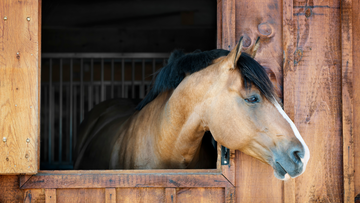Horse owners and enthusiasts often debate the best living conditions for their equine companions: stalls or pastures. Both options come with advantages and drawbacks, and ultimately, the decision depends on an individual horse's needs and the owner's resources. By examining the pros and cons, one can make an informed decision.
Benefits and Downsides of Keeping Horses in Stalls
Advantages
Keeping horses in stalls provides them with a sheltered environment, protecting them from rain and adverse weather conditions. This controlled environment also helps maintain consistent footing, ensuring the horse's safety and comfort while standing or lying down.
Horse barns can be designed to provide adequate water supply and controlled feeding schedules, promoting the horse's health and well-being. Another benefit of stabling is that it allows for easier access to the horse for training, grooming, and medical care.
Disadvantages
Despite the benefits, there are also downsides to keeping horses in stalls. Limited mobility may lead to decreased muscle development and increased risk of health issues.
Stalls require regular cleaning and maintenance to prevent ammonia buildup from urine and manure, which can cause respiratory problems. Stable footing must be monitored as well to avoid uneven or slippery surfaces.
In addition, keeping horses in stalls may inhibit social interaction, which is essential for their mental health and well-being. This confinement can cause stress and lead to undesirable behaviors, such as stall kicking or weaving.
Advantages and Disadvantages of Horse Pasturing
Strengths
Horse pasturing allows horses to have a natural turnout, which promotes physical and psychological well-being. They have the opportunity to play, socialize, and graze while benefiting from fresh air and sunlight.
Nutrition is another advantage of pasturing, as horses can access a variety of grasses and forage, sustaining a balanced diet. Rotating fields help maintain the quality and variety of nutrients, further enhancing horses' health.
Weaknesses
However, horse pasturing also comes with a few drawbacks. Fencing and maintaining the field can be expensive, and not all land is suitable for pasturing. Ensure the fields have sufficient drainage to prevent hazardous, slippery footing, especially during heavy rain.
Also, the availability and quality of natural forage might vary depending on the geographical area and climate. In regions with harsh winters or dry summers, horse owners might need to supplement their horses' diets with extra hay or grain to maintain proper nutrition.
Practical Considerations
Size and Location
 When deciding whether to keep horses in stalls or pastures, it's essential to consider the size and location. Horses need around one to two acres of space per horse in a pasture setting. For stalls, a recommended size is at least 12x12 feet. Access to travel and veterinarian services should be considered, as should the ease of access for management tasks (feeding, grooming, etc.).
When deciding whether to keep horses in stalls or pastures, it's essential to consider the size and location. Horses need around one to two acres of space per horse in a pasture setting. For stalls, a recommended size is at least 12x12 feet. Access to travel and veterinarian services should be considered, as should the ease of access for management tasks (feeding, grooming, etc.).
Weather Conditions
The local climate plays a significant role in choosing between stalls and pastures. Horses benefit from being turned out in fresh air, but extreme weather conditions (e.g., excessive rain, heat, or cold) may necessitate using stalls for shelter. Horses that are prone to weaving, biting, or other stress-related behaviors may benefit from more time in an outdoor environment but show horses or young horses may need more protection from harsh conditions.
Fencing and Safety
Fencing for pastures needs to provide adequate safety for horses while allowing enough room for them to move. Proper cross-fencing helps to manage the pecking order among horses and can prevent injury. Regarding fencing materials, consider options that offer high visibility and durability. Stalls should also have sturdy walls, doors, and flooring, with additional measures like rubber mats to ensure safety and comfort for the horses.
Management and Routine
Establishing a consistent routine for horses in both stall and pasture settings is crucial. A feeding schedule, veterinary care, and regular exercise should be maintained, regardless of housing type. Night turnout is an option for horses in stalls who need additional exposure to fresh air.
Stalls require regular cleaning, and horses may need more attention to their intestinal health and joint health due to the more confined space. Use of the Benefab SmartScrim can aid in keeping a stalled horse comfortable by aiding in circulation and stiffness, among other benefits. On the other hand, pastures may need more maintenance in terms of fencing and monitoring the quality of the grazing area, such as preventing overgrazing.
The choice between stalls and pastures ultimately depends on the individual needs of the horses, the available resources for management, and the specific conditions of the location.






















